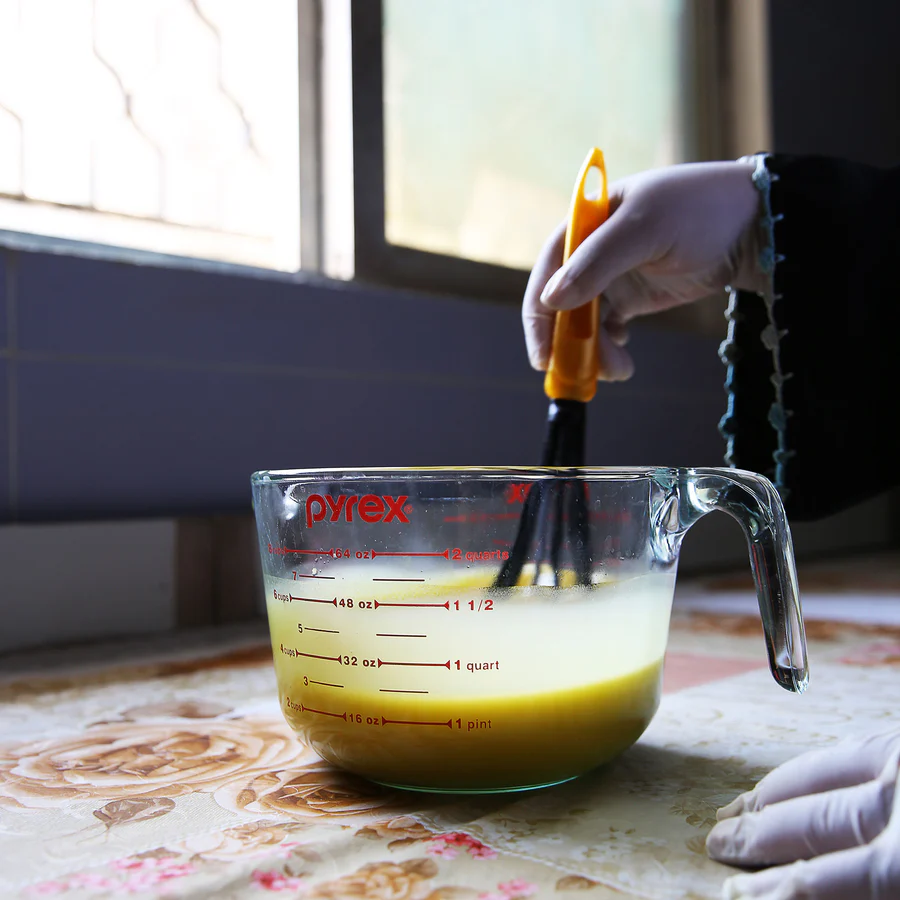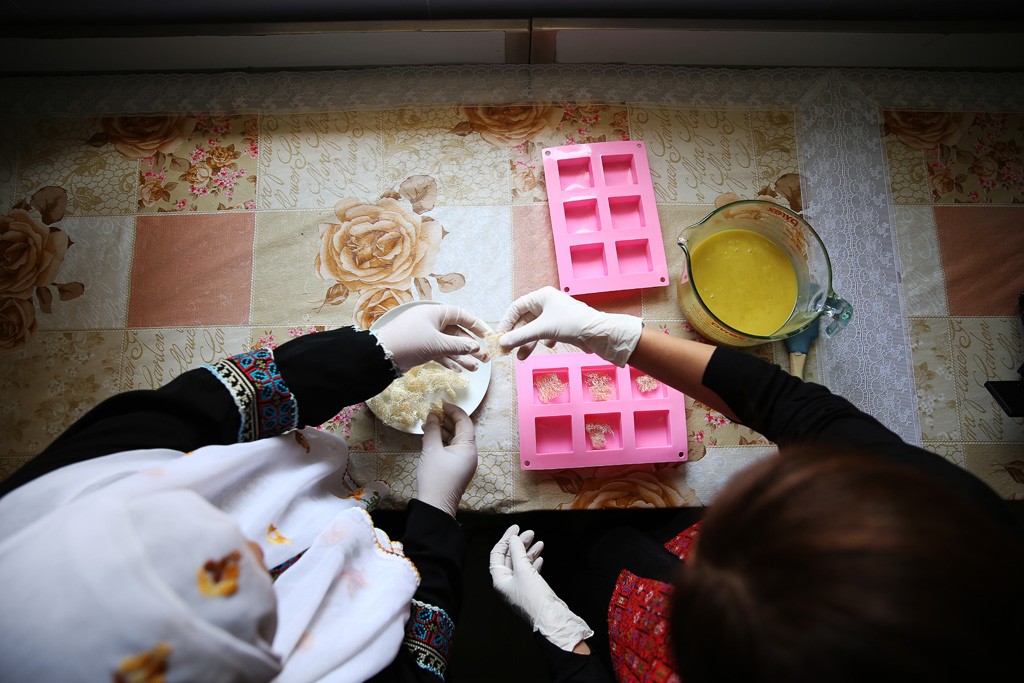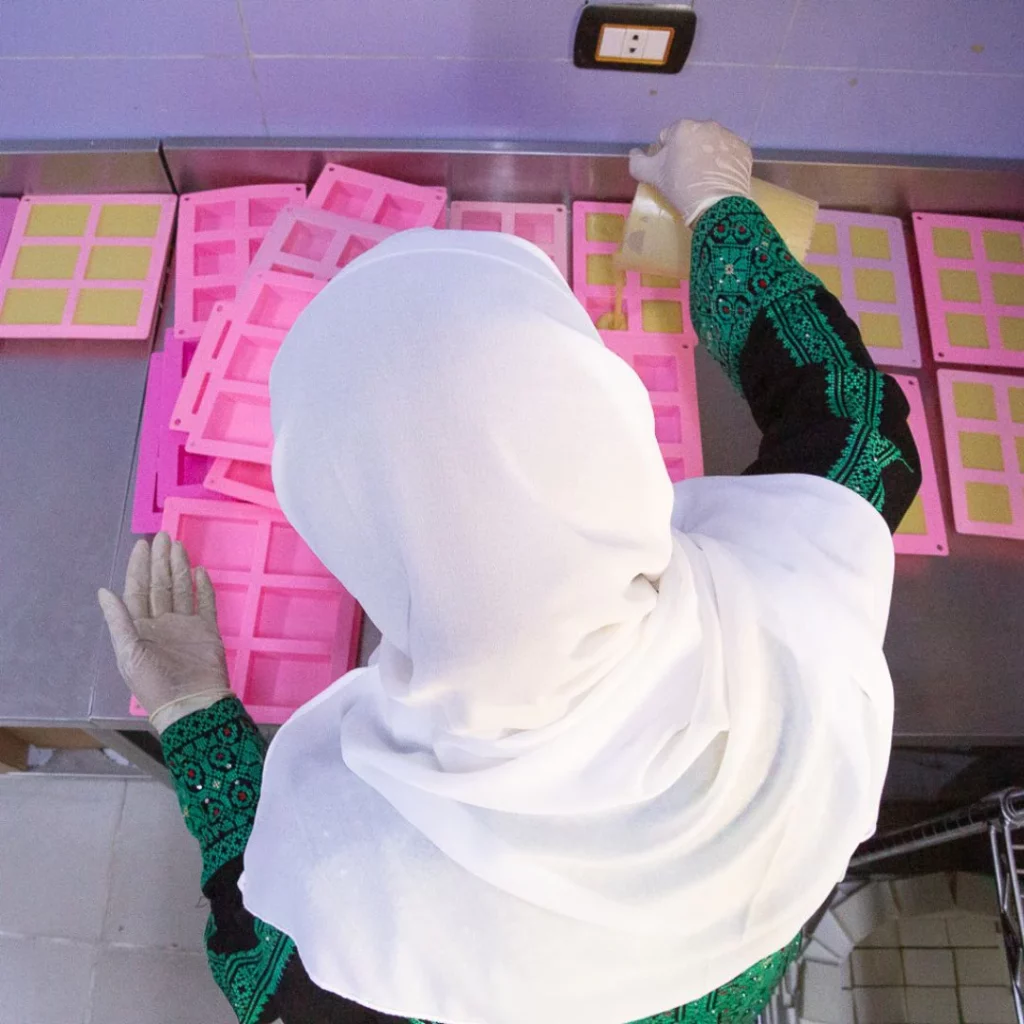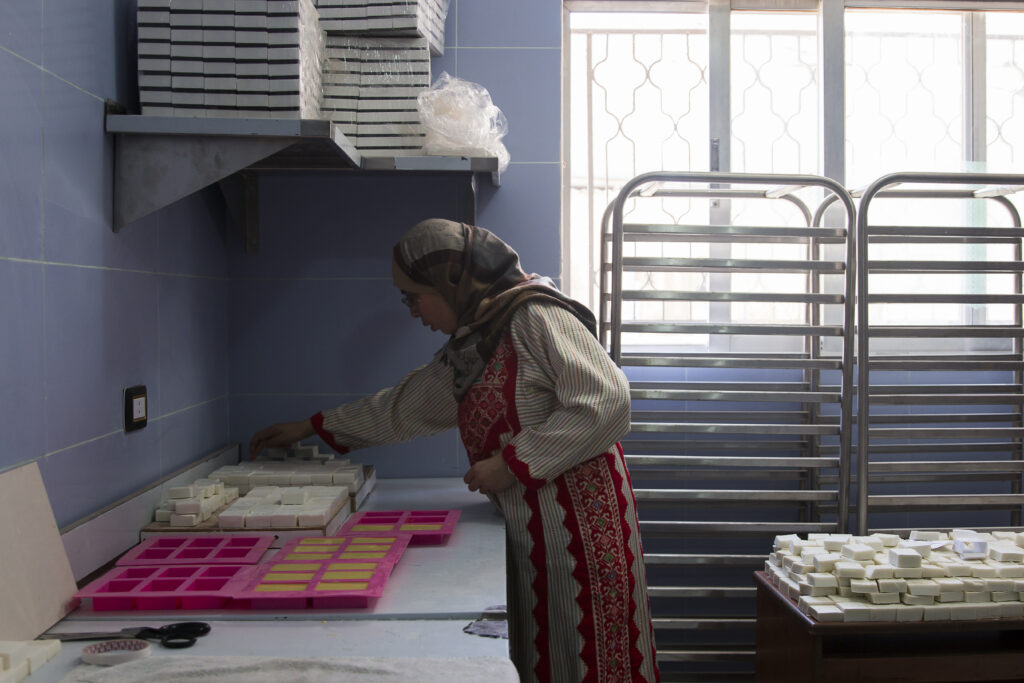By Dahab Shakoura
Listen to this article
Noora Sharrab remembers her grandmother’s daily ritual from visits to Egypt when she was a child. There, the older woman, who had fled Gaza and was forced to rebuild her life, carried with her a tradition of using homemade olive oil soap to wash: her hair, her face, her whole body. Though Sharrab didn’t realize it at the time, her grandmother’s dedication left an imprint, shaping her journey and cultivating a profound appreciation for heritage and simplicity. Each lather of the gentle, fragrant soap reaffirmed her grandmother’s commitment to a time-honoured custom, untouched by modern conveniences.
“That was all she used,” recalled Sharrab, now 38 and a successful businesswoman who left a marketing and communications job in 2018 to commit full-time to leading a company she co-founded in Mississauga years after those visits with her grandmother. The cornerstone product of the company, SITTI — which means grandmother in Arabic — is olive oil soap made by refugee women in Jordan. It’s sold online and through Whole Foods Markets across Ontario. The oil is sourced from the groves of Jerash, Jordan, where Sharrab, a graduate of York University in Toronto, Ontario, spent time researching her master’s degree thesis exploring intergenerational differences within Palestinian identity, which was published in 2011.
Sitti is unique among small businesses because it is organized as a social enterprise, so it isn’t just concerned about profits, said Ann Armstrong, director of ICUBE, which supports social entrepreneurship and early-stage start-ups at the University of Toronto Mississauga. The aim of a social enterprise is to cover its operating costs so it can prioritize pursuing the social impact at the core of its mission, Armstrong said, adding that social enterprises must balance a fundamental tension between financial viability and the core mission. There are about 100 such businesses in the Greater Toronto Area, she said, which represents a small fraction of the more than 444,000 small businesses in Ontario tracked by the federal government’s department of innovation, science and economic development.
“The absolutely most important success factor is an unflinching commitment to its mission and whatever social justice outcome it wants,” Armstrong said. “It also, however, at a minimum, needs to be breaking even… but the moment the social enterprise drifts from its social commitment then it’s not a social enterprise, it’s a plain old business.”
In Sitti’s case, the social mission is to create opportunities for marginalized communities, particularly refugees, from its headquarters in Mississauga. Focusing on employment, it has provided livelihoods for 34 refugee families in Jordan, with a ripple effect across the community. The mission statement describes Sitti as “a conscious lifestyle brand committed to the self-reliance of refugee and displaced communities through long-term employment opportunities and skill development training, empowered by an inclusive global economy.”
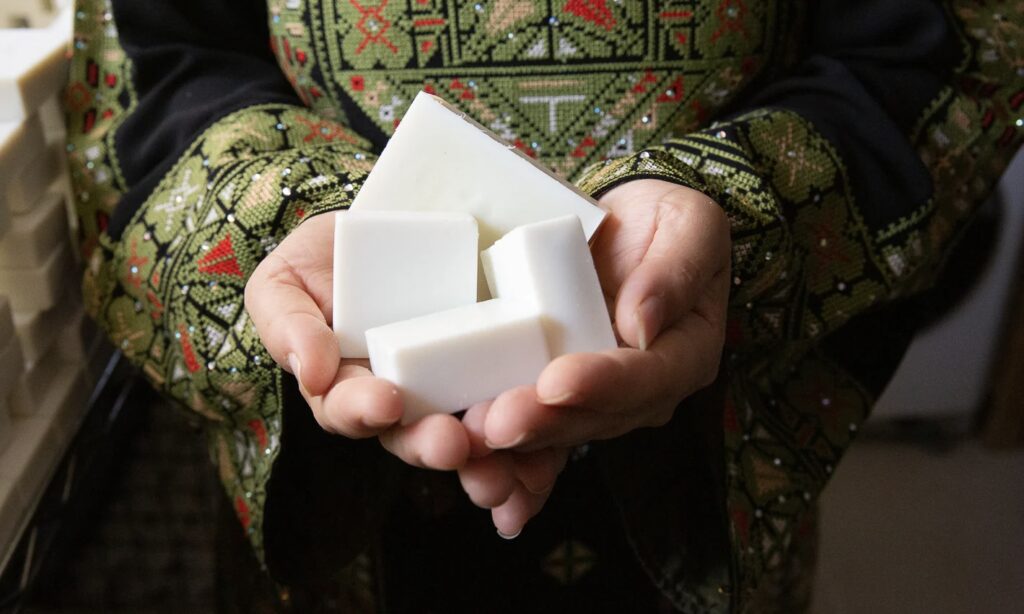
The product line has expanded to include other hand and body products, such as wooden soap dishes, loofahs, gift sets, apparel, a kitchen collection of wooden utensils and aprons, dried herbs, and a recent Palestinian solidarity collection. Prices vary depending on the item, with soap bars starting at $5.50, wooden soap dishes at $12, and gift sets ranging from $20 to $165.
Thinking back to visits with her grandmother in Egypt on a recent Tuesday morning, Sharrab, who is the CEO of Sitti, described her younger self as not yet able to appreciate the history and cultural importance of the organic soap that would become such a big part of her own daily life. At the time, she preferred store-bought brand-name soap and thought her grandmother should, too.
“Grandma, we have all these new items, like, you should use those,” the young Sharrab would suggest, pointing to their convenience. “No, this is a signature,” her grandmother would respond.
“She would always pack it with her everywhere she went,” Sharrab said, her voice soft and reflective. “And it was almost this resonance, like it resonated with me.”
When Sharrab described the soap-making process on that recent cloudy morning, her enthusiasm was palpable, reflecting her dedication to preserving this age-old craft. “Every bar is made by women using the traditional cold-pressed method…basically not using heat in the process,” she said, describing a combination of lye, olive oil, and water that saponifies – or adds properties of hardness and moisture – to form the soap. The soap is then poured into a mold and left to dry. It requires an additional six to eight weeks of resting before it can be packaged and shipped to customers. For her, the long process is symbolic of what grandmothers embody, preserve and pass down from generation to generation.
“When I think of my grandmother, I think of the most simplest ingredients, the simplest ways of living life, the ways of giving and the ways of generosity,” she said. “And so Sitti really is about that.”
The company was launched in 2015, but Sharrab traces its roots back to 2009 when she co-founded a non-profit organization called “Hopes for Women in Education” while working in refugee camps in Jordan during her studies.
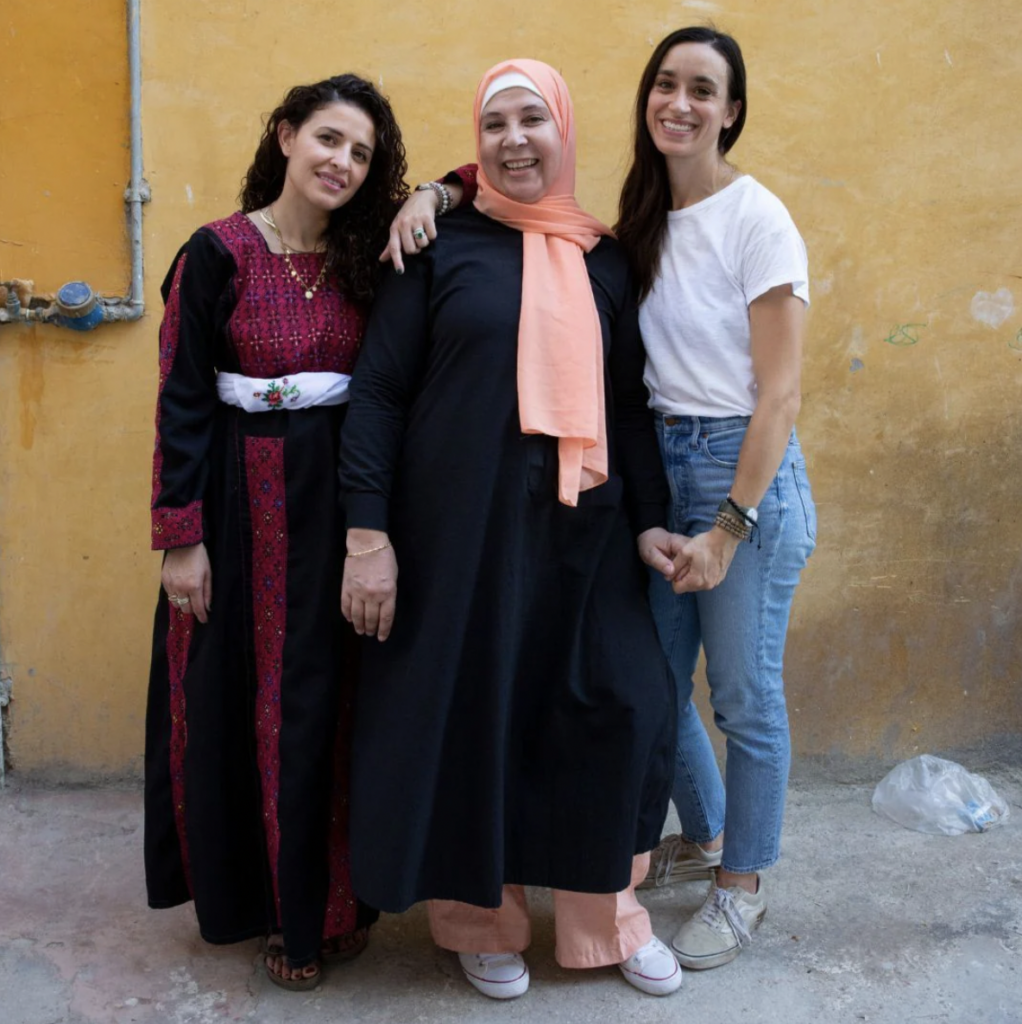
Through this work, she met Safiah Abu Shanin and Jacqueline Sofia, who became co-founders of the soap company. Their paths intersected with a group of women trained by the Italian embassy in cold-pressed soap-making, and Sharrab envisioned the potential impact of combining these traditional techniques with a mission of social empowerment. At the time, Sofia was independently working with a group of women to sell soap. They decided to collaborate, aligning their visions to uplift women under the banner of Sitti.
Sharrab had already worked in the non-profit sector and said the project reaffirmed her belief that “the gap isn’t just to provide charity for underprivileged communities, it’s really about creating opportunities.”
Abu Shanin was born in Gaza and, in 1973, she understood the challenges of living as a refugee firsthand, a perspective that informs Sitti’s mission. “I experienced the humiliation of being looked after by different organizations just to provide the basics,” she recalled during a recent telephone interview conducted in Arabic from the Jerash camp in Jordan. “I was always dreaming of being independent, living normally, caring for myself, and not needing the help from aid organizations.”
She made her way from UNRWA schools in the Jerash camp to Jerash University. Like Sharrab, she volunteered with “Hopes for Women in Education,” where she sought to empower women with knowledge and skills for independence, particularly refugee women who, like her, have navigated the hardships of displacement.
These days, Abu Shanin spreads her message through Sitti, appearing in a 2023 video posted to Instagram accounts of the Mississauga company and L’Occitane Middle East, a division of the global skincare company that forged a corporate brand partnership with Sitti in 2022. The April 6 video featuring Abu Shanin, one of a series posted by the two companies, showed rustic brick homes and harsh living conditions in the refugee camp alongside the skilled craftsmanship of women machine-weaving and trimming loofahs with precision.
“The woman who does this work is a strong woman and a warrior, a successful person is one who can change something in their home and community,” Abu Shanin said in the video.
According to Sitti’s 2021-22 Impact Report, 92 per cent of the company’s employees, referred to as team members, were women or women-identifying. In addition, 86 per cent of paid management positions were held by women.
Through the partnership with L’Occitane, Sitti was able to boost the incomes of 14 refugee women it employs (45 per cent of all women team members), who often receive only part-time earnings. The partnership resulted in 1,192.90 additional hours of work secured for the women artisans. The company described a gift-with-purchase campaign for the 2023 Ramadan season – which involved natural loofah scrubbers and pine soap dishes made by Sitti – as “the largest revenue-generating partnership” to date.
Sharrab’s journey to leading Sitti didn’t follow a straight path. After she completed her education, she found herself at a crossroads. Expecting her second child, she had transitioned to a desk job in search of stability. However, as she built a marketing and communications career, ultimately working at a dental practice, a yearning for something more persisted.
“I was sick of working all my days towards something that didn’t have impact, that wasn’t creating fundamental change in people and helping them get better – and Sitti was a cause bigger than myself,” she said.
“I knew the women depended on this, this was their way out in the world they lived in.”
Noora Sharrab

